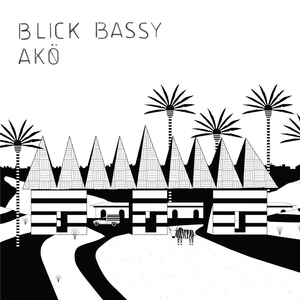Blick Bassy formed his first band in Cameroon at the age of 17. They were called The Jazz Crew and would later develop into Macase, an inventive jazz fusion group inspired by local rhythms with three singers, all singing a different Cameroonian language. It was here that Blick began to ...
reinvigorate Bassa as a language that could be used in modern music, a language that he felt the younger generations should appreciate. After 10 years of performing with Macase – in which the group toured around Africa and played a number of festivals in Europe – Blick grew frustrated with the lack of infrastructure for an artist in Cameroon and decided to move to Paris. It was there, in 2005, that Blick started his solo career, at first collaborating with a wide range of artists, before eventually releasing his debut album Léman (a record that fused West African and Central African rhythms) in 2009, and following it up with Hongo Calling (which was recorded in Brazil following Blick's research into the musical link – mainly through slavery – between Cameroon and Brazil) in 2011. After the release of this album he moved to Cantin, a small village in the North of France, which is where you'll find Skip James' photo hanging on his wall.
Written and sung by Blick Bassy - in Bassa, one of some 260 spoken languages in Cameroon - and
accompanied by a unique ensemble of guitar, banjo, cello and trombone - Akö’s eleven sparklingly
original tracks are a musical revelation. Remarkable then, to consider that these are recordings that
were never intended for release. Bassy’s original idea was to get together with the cellist Clément Petit and trombonist Fidel Fourneyron to record a few songs in homage to his longtime hero Skip James. By chance, the studio they hired was directly below the offices of Nø Førmat!, the innovative French label run by Laurent Bizot, who happened to hear the results of this unlikely yet inspired musical alchemy. As Laurent relates, “when I heard the first song Aké, I was stunned. It sounded like a dream, so light, a voice floating in the sky. Production was minimal but bold and the music had a feel not often heard with African songwriters. They had taken risks they probably wouldn’t have done if the music was meant for release. The lack of budget, the time restraints and the restriction to three musicians has conjured something entirely unique and very fresh. Exactly what I like!” Encouraged by Bizot to record more, the three musicians emerged from the seven-day session with the makings of an album that amounts to the most personal of Bassy’s career. As with the rasping trombone that evokes the familiar whistle of a transcontinental train on Kiki, this album speaks of Bassy’s separation from and connection with home. Sung in Bassa, a language and tradition that he has long championed, Bassy sings of the village he grew up in rural Cameroon drawing connections between the itinerant musicians of his childhood with journeyman blues legend Skip James. While the influence of the Malian folk of Ali Farka Toure can be detected on Tell Me and Mama, and the complex melodic patterns betray his Cameroonian roots throughout, this is an album that makes subtle references to a musical palette that ranges from the Gypsy Swing flavours of Wap Do Wap to the sparse and haunting singer songwriter classic in the making Ndjèl.










